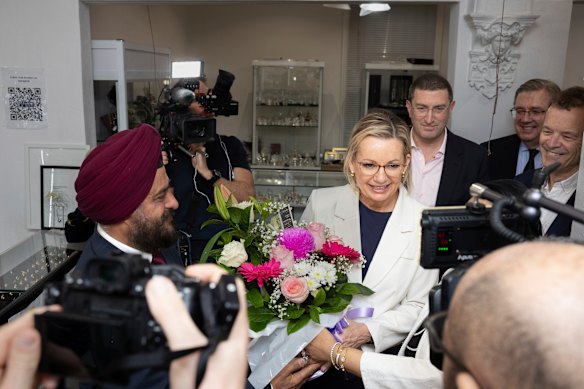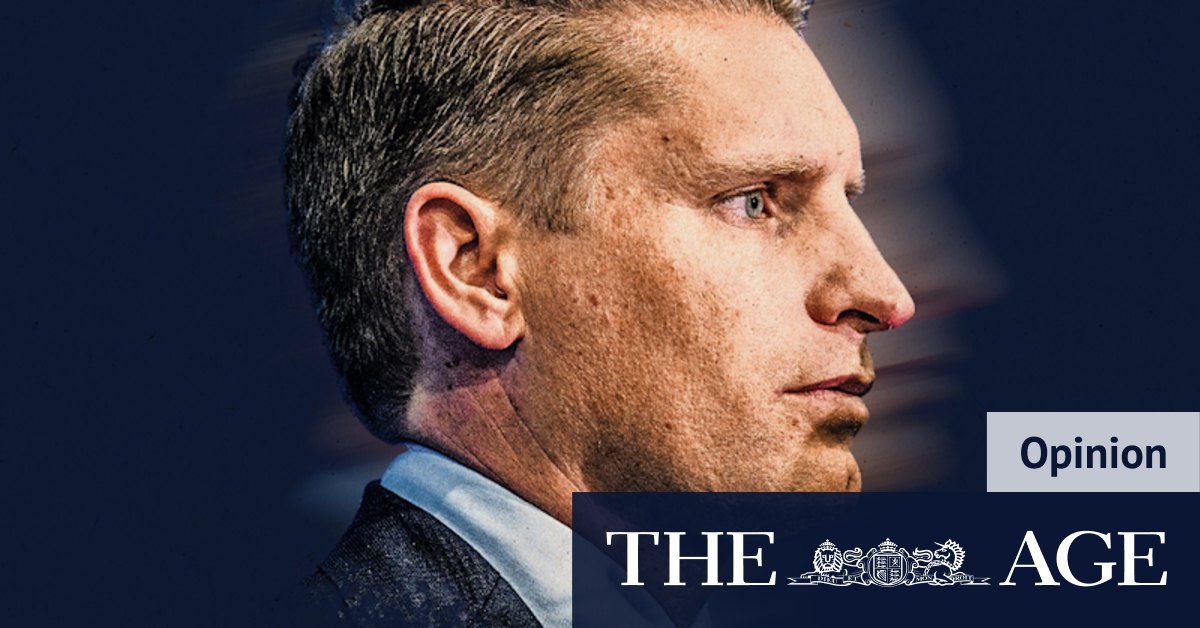He was careful to take counsel with a handful of trusted allies, including only two Liberal MPs, so that he couldn’t be accused of “doing the numbers” as a prelude to a leadership challenge.
He told the most trusted of his trusted circle, his wife, Ruth, that he’d have to take a 25 per cent pay cut if he went ahead with the resignation. She rejoined that the family budget would simply have to adjust.
Loading
He phoned Ley at 7.45am on Friday last week to tell her he was quitting the shadow ministry. He resigned on the principle that he would not be able to observe cabinet solidarity. He felt too strongly about immigration to stay shtum.
He told Ley that he’d be doing media after the call. Ley asked him to postpone until 5pm so as not to detract from her day’s program. He agreed. The next day, he called a press conference to disavow any intention to challenge her for the leadership and to express his support for Ley. He has since declined a blizzard of media invitations.
So Hastie is not hostile to Ley. “She should take comfort from the fact that there’s no unified bloc against her. The party is still divided,” he’s told confidants. But he is now setting up in competition to her. He intends to use his backbench latitude to make “calibrated and principled” statements about matters he cares about.
He is staking out a more conservative ground than Ley. In this way, he’s also in competition with the leader of the Liberals’ conservative faction, Angus Taylor. Because Taylor, opposition defence spokesman, must respect cabinet solidarity while Hastie is free to move to the right of his leaders.
Loading
Hastie respects Ley’s mandate to lead and Taylor’s seniority in the party. His name is something of a misnomer; he is not in any haste. This is sensible. The Liberals are in a dire electoral position and the party is riven with internal resentments. To assume the leadership today is a political suicide mission.
So the second theory – of the schemer hatching a plot – is closer to the truth. But he lacks the hostility and the intemperance of the typical leadership plotter. He resigned on a point of principle, and he’s notable in his exercise of restraint.
At 43, Hastie has plenty of time. He plans to invest much of it in his young family while developing both his social media profile and his substantial policy profile. On climate change (he opposes net zero), on housing policy, on productivity. But above all, on immigration. Hastie aroused a lot of fear and suspicion with a line in a 17-slide Instagram post on immigration last month: “We’re starting to feel like strangers in our own home.”
This recalled the infamous anti-immigration speech of British Conservative Party firebrand MP Enoch Powell in 1968. In his “Rivers Of Blood” speech, Powell described a future in which Britons “found themselves made strangers in their own country”.
Hastie doesn’t want to shut down the immigration program. But he’s not Robinson Crusoe in wanting to cut it. That’s the stated intention of both the Albanese government and Ley’s Coalition.

Opposition Leader Sussan Ley in Sydney’s “Little India” on September 7, after senator Jacinta Nampijinpa Price said the government was bringing in “large numbers” of Indian migrants because they voted for Labor.Credit: Sitthixay Ditthavong
After two COVID years with zero immigrants, the intake staged a two-year catch-up that added almost a million people to the population. There is an unspoken Canberra consensus that this was predictable yet poorly managed, a serious mistake. The intake is now falling.
Hastie, however, wants to cut harder and faster than the Liberal leadership is prepared to. He wants to return the level of net overseas migration to its scale of about a decade ago. Meaning a halving from its 2023-24 level, which was 446,000. Temporary foreign students accounted for 207,000 of these. Hastie thinks universities are abusing the international student system to make easy cash. He sees it as ripe for a major pruning.
Loading
He does not want to hack into the permanent intake of new settlers. Indeed, his own electorate of Canning in Western Australia is rich with immigrants from Britain, India, the Philippines and elsewhere. One of the immigrants is his wife, Ruth, now an Australian, whom he met in her native US.
“But what’s the point of migrating to Australia if you can’t buy a home?” he says to colleagues. “I want to make the Australian dream sustainable.”
“If we don’t act, we can expect anger and frustration,” he wrote in his Instagram effort. “We might even die as a political movement.”
The final slide in this stack cites late Formula 1 champion Ayrton Senna as a source of inspiration for political strategy: “If you no longer go for a gap that exists, you’re no longer a racing driver.”
He’s going for the gap. Otherwise, Pauline Hanson’s One Nation seems the likely beneficiary of rising frustration with immigration levels. So far, Australian politics has remained remarkably and gratefully immune to the xenophobia and sensationalism of Farage and Donald Trump and Alternative for Germany and Marine Le Pen and the rest.
One Nation’s share of the primary vote at the May election was 6.4 per cent, a gain of a bit over one percentage point on the 2022 election. In Hastie’s seat, it was 11.4 per cent this year, a doubling of its share.
Hastie intends that he, not Hanson, will be riding the train of nativist immigration policy. In contrast to Hanson, Hastie is no racist. He uses his experience in his father’s church as a model for successful multiculturalism.
He grew up in multicultural Ashfield in Sydney’s inner west, where his dad was a Presbyterian pastor. The church ran a roster of services in English, in Mandarin, in Korean, in Samoan. It was a harmonious congregation of many nationalities, bound by common values.
But wait. As opposition leader, Peter Dutton did go to the polls promising a major cut to the immigration intake. It certainly didn’t protect him from a thrashing of historic proportions. So what makes Hastie think it could work electorally in the future if it proved so ineffectual in the recent past?
“We didn’t talk about it,” Hastie told the ABC’s Patricia Karvelas recently. The problem wasn’t the policy but the marketing of it, he says. He sees the oncoming train of a nativist, populist movement heading for Australia’s shores regardless of the evidence of election day, 2025.
If so, he should beware the rejoinder to the Dominic Cummings line in the Brexit movie. “Be careful what you wish for. You won’t be able to control it either.”
Peter Hartcher is political editor.
Cut through the noise of federal politics with news, views and expert analysis. Subscribers can sign up to our weekly Inside Politics newsletter.

